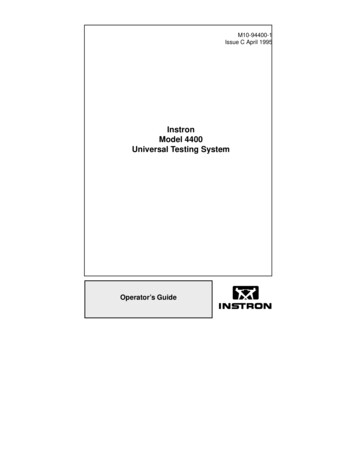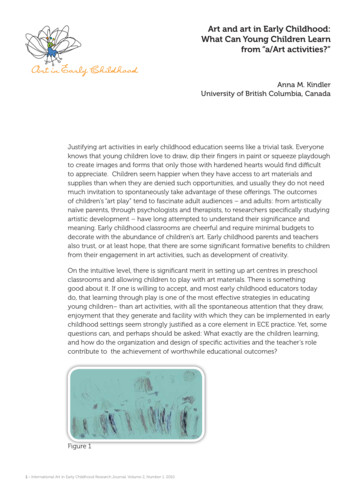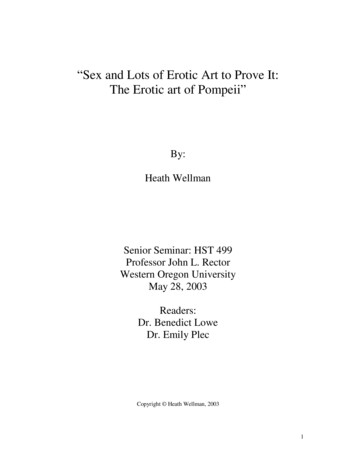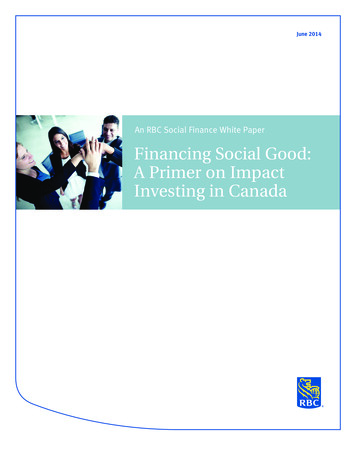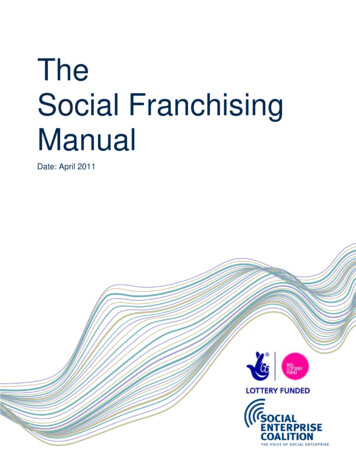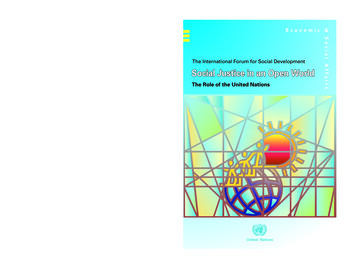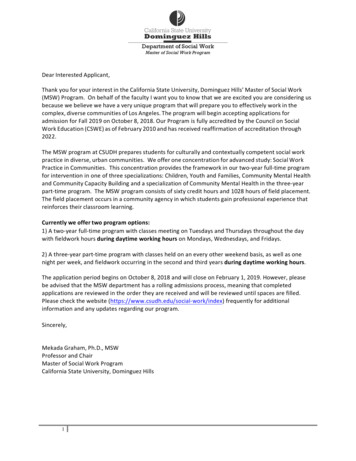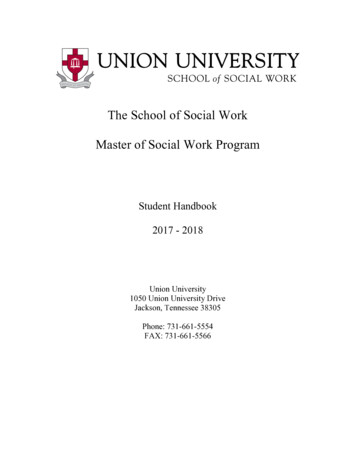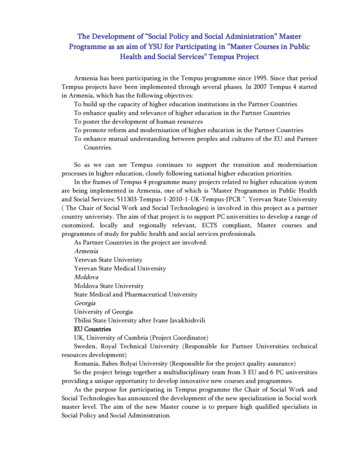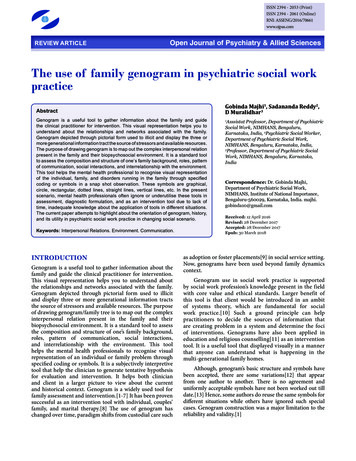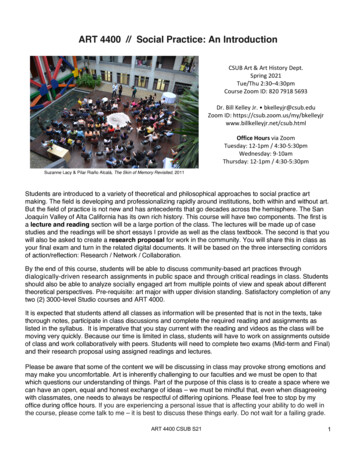
Transcription
ART 4400 // Social Practice: An IntroductionCSUB Art & Art History Dept.Spring 2021Tue/Thu 2:30–4:30pmCourse Zoom ID: 820 7918 5693Dr. Bill Kelley Jr. bkelleyjr@csub.eduZoom ID: net/csub.htmlOffice Hours via ZoomTuesday: 12-1pm / 4:30-5:30pmWednesday: 9-10amThursday: 12-1pm / 4:30-5:30pmSuzanne Lacy & Pilar Riaño Alcalá, The Skin of Memory Revisited, 2011Students are introduced to a variety of theoretical and philosophical approaches to social practice artmaking. The field is developing and professionalizing rapidly around institutions, both within and without art.But the field of practice is not new and has antecedents that go decades across the hemisphere. The SanJoaquín Valley of Alta California has its own rich history. This course will have two components. The first isa lecture and reading section will be a large portion of the class. The lectures will be made up of casestudies and the readings will be short essays I provide as well as the class textbook. The second is that youwill also be asked to create a research proposal for work in the community. You will share this in class asyour final exam and turn in the related digital documents. It will be based on the three intersecting corridorsof action/reflection: Research / Network / Collaboration.By the end of this course, students will be able to discuss community-based art practices throughdialogically-driven research assignments in public space and through critical readings in class. Studentsshould also be able to analyze socially engaged art from multiple points of view and speak about differenttheoretical perspectives. Pre-requisite: art major with upper division standing. Satisfactory completion of anytwo (2) 3000-level Studio courses and ART 4000.It is expected that students attend all classes as information will be presented that is not in the texts, takethorough notes, participate in class discussions and complete the required reading and assignments aslisted in the syllabus. It is imperative that you stay current with the reading and videos as the class will bemoving very quickly. Because our time is limited in class, students will have to work on assignments outsideof class and work collaboratively with peers. Students will need to complete two exams (Mid-term and Final)and their research proposal using assigned readings and lectures.Please be aware that some of the content we will be discussing in class may provoke strong emotions andmay make you uncomfortable. Art is inherently challenging to our faculties and we must be open to thatwhich questions our understanding of things. Part of the purpose of this class is to create a space where wecan have an open, equal and honest exchange of ideas – we must be mindful that, even when disagreeingwith classmates, one needs to always be respectful of differing opinions. Please feel free to stop by myoffice during office hours. If you are experiencing a personal issue that is affecting your ability to do well inthe course, please come talk to me – it is best to discuss these things early. Do not wait for a failing grade.ART 4400 CSUB S211
REQUIRED TEXTBOOK Pablo Helguera. Education for Socially Engaged Art: A Materials and Techniques Handbook, (JorgePinto Books, 2011).Students must plan to have the textbook by the second week of class. It is available online, includingAmazon.com. Please speak with me if you are having difficulty obtaining a copy.RECOMMENDED TEXTS(for students interested in pursuing topics in greater depth) Grant Kester, Conversation Pieces: Community and Communication in Modern Art, (University ofCalifornia Press 2013).Bill Kelley Jr., Grant Kester, eds. Collective Situations: Readings in Contemporary Latin AmericanArt, 1995-2010, (Duke University Press, 2017).Suzanne Lacy, Mapping the Terrain: New Genre Public Art, (Bay Press, 1994).Johanna Burton, Shannon Jackson, Dominic Willsdon, eds. Public Servants: Art and the Crisis of theCommon Good, (MIT Press 2016).GRADE BREAKDOWN25% - Midterm25% - Final35% - Proposal Project15% - ParticipationA : 100-98B : 89-88C : 79-78D : 69-68F/I: 59 and belowA: 97-93B: 87-83C: 77-73D: 67-63A-: 92-90B-: 82-80C-: 72-70D-: 62-60ATTENDANCE & PARTICIPATIONYour participation grade is a combination of attendance at visiting artist talks, contributions to classdiscussions, group work, and pop quizzes. It is expected that students attend all classes as information willbe presented that is not in the texts. Regular attendance is key as there will be a great deal of materialcovered in class that is not in the textbook. Two classes can be missed without an excuse. Every absenceafter two will cause one point to be deducted from your final grade. Habitual tardiness will also affect yourfinal grade (each late arrival after two will count as half an absence). If you are absent for a familyemergency or extended illness, please come talk to me to arrange for work to make up the material missed.Because nonverbal feedback is helpful in human interactions, I expect students in this class to keeptheir cameras on during synchronous portions of online instruction. With this in mind, please planwhere you will be during class time so you can participate in a setting that is free from visualdistractions. Repeatedly having your cameras off will affect your Participation grade. If you believe youhave a legitimate reason not to have your camera turned on, please consult with me well in advance of theclass period, and I will make a determination.ART 4400 CSUB S212
EXAMSThe two exams will not be cumulative. There will be a class prior to each exam where we review thematerial and students are encouraged to study together outside of class. Missed exams will count as an “F”unless the student has a valid excuse, cleared in advance, in which case a make-up exam will be arranged. Midterm Written Exam: Tue. 3/23 // Midterm Proposal Presentation: Thu. 3/23-3/25 Final Exam / Proposal Presentation: Thu, 5/20 (2-4:30pm)POP QUIZZESThere will be periodic pop quizzes given in class based on the reading material most recently assigned orlecture material most recently presented in class. These will count as part of your participation grade.VISITING ARTIST TALK REQUIREMENTAs part of your participation in this class you are required to go to one visiting artist talk this fall semester (ifyou’re unable to go to any of these talks, please let me know as soon as possible to arrange an alternativeassignment). You will have to turn in a 250-word summary of the topics covered.ACADEMIC ACCOMMODATIONSIf you have any needs or require accommodations related to a disability or learning difference, pleasecontact the Office of Services for Students with Disabilities (SSD). You can reach them by calling 661-6543360 / TDD 661-654-6288 or visiting SADM 140. Once you have your accommodations letter, pleaseschedule a time to meet with me during office hours to coordinate your accommodations.RESPECT FOR THE CLASSROOM ENVIRONMENTPlease show courtesy to your peers and instructor through: Coming to class on time and not leaving early. If you must, please let me know in advance and sit bythe door to minimize disruptions. Putting laptops and tablets away during class (unless approved for academic accommodations). Turning off or silencing cell phones and not text messaging. Refraining from carrying on private conversations, passing notes, or sleeping in class.TECHNOLOGY FOR ONLINE COURSE & EMAIL USETo assure your ability to benefit from all of the resources available in this class, please be sure you have acomputer that meets or exceeds the following standards: A PC or Mac laptop with at least an i5 processor or equivalent8 GB of RAM / 256 GB hard driveA web camera (built in or stand-alone)High speed internet accessPlease also check your CSUB email regularly, at least once a day, as faculty use it to communicateimportant information about class and assignments. The instructor will only check his CSUB email duringworking hours (M-F 8am-6pm) and will not be checking phone messages during this semester.ART 4400 CSUB S213
LATE ASSIGNMENTS & PLAGIARISMLate assignments and exams will not be accepted unless prior arrangements are made (i.e. a legitimate,justifiable reason is needed for me to consider granting a student extra time, so plan ahead and budget yourtime) or if you have a justifiable illness with a doctor’s letter. If you have an excused absence and yourassignment is late, send it to me as an e-mail attachment as soon as it is complete and then check with meto see if you need to follow up with a hard copy. It is your responsibly to follow up on late assignments.Always be careful about plagiarism. Plagiarism is the use of another person's ideas or words without properacknowledgement. Two of the most common forms of plagiarism are defined by Diana Hacker in TheBedford Handbook for Writers (1994) as: “1) borrowing someone's ideas, information, or language withoutdocumenting the source and 2) documenting the source but paraphrasing the source's language tooclosely, without using quotation marks to indicate that language has been borrowed" (477). The instructorregularly checks to see if material has been plagiarized. Please ask me if you are unsure of when shouldyou document a source (see Hacker 477-78) or what is meant by paraphrasing too closely (Hacker 467-79)and read CSUB’s statement on Academic Integrity: ULEPlease note, changes may be made to the schedule if necessary and will be announced at the beginning of classv WEEK 1 1/26, 1/28 - Introduction to the class§§§COVER: Class syllabus and course Research ProposalMind Mapping exercise, upload to Box folder and share with class.READ: Helguera, Ch. 1: Definitions (pp. 1-8)v WEEK 2 2/2, 2/4 – Happenings: A review of historical case studies in the public sphere§§PRESENTATION: Informal 1st draft proposal exchange: An informal presentation of a localsite/community you find interesting that could serve a basis for your project. Bring in anobject that represents the space and issue you wish to study. (10 min.)READ: Helguera, Ch. 2: Community (pp. 9-25)v WEEK 3 2/9, 2/11 – Case Study: La Piel de la Memoria (The Skin of Memory)§ Lecture on La Piel de la Memoria by Suzanne Lacy and Pilar Riaño Alcalá (Medellín, 1998& 2011)§ READ: “Skins of Memory: Art, Civic Pedagogy, and Social Reconstruction” by Suzanne Lacyand Pilar Riaño Alcalá in Collective Situations. (PDF online)§ WATCH: Project videos: https://tinyurl.com/y853yoeg & https://tinyurl.com/ybl4a7f3§ PRESENTATION: Write up 250-word reflection on the project and orally present your reflection.ART 4400 CSUB S214
v WEEK 4 2/16, 2/18 – Research Proposal Studio time and Feedback // Social work or practice?§§§§STUDIO: On days cited as Studio, I am giving you studio time to work on your project.On Studio days I will host one-on-one sessions with you to see who you’re talking to for yourresearch topic and go over your long-term research plan. Scheduling done on Doodle.DISCUSSION: What is the difference between social practice and social work?READ: Helguera, Ch. 3: Situations (pp. 27-38)v WEEK 5 v2/23, 2/25 –Semi-formal 2nd draft proposal exchange / Freire reading§PRESENTATION: A more formal presentation of the materials you have researched, andcontacts made so far in your local site/community. Bring PowerPoint and materials.§§Paulo Freire: Pedagogy and DialogueREAD: “Paulo Freire: Discussing Dialogue” by Tom Finkelpearl in Dialogues in Public ArtWEEK 6 3/2 – Studio time and Feedback / Dialogue as a methodology§§§§STUDIO: On days cited as Studio, you will have studio time and private sessions with meChapter discussion on dialogue and conversation as an artist’s tool.READ: Helguera, Ch. 4: Conversation (pp. 39-49)No Class on Thu 3/4. Professor is out of town.v WEEK 7 3/9, 3/11 – Collaboration and its challenges / Case Study: El Señor de Maíz (The Corn Man) /Guest speaker Teresa Flores presents.§ Artist Teresa Flores (Los Angeles/Fresno) joins us on 3/9 to present her work.§ Collaboration and its challenges to authorship§ READ: Helguera, Ch. 5: Collaboration (pp. 51-57)§ Case Study: Alfadir Luna, El Señor de Maíz (Mexico City, 2009-2019)§ READ: Liz Goldner, “Corn Man: A Mexican-Inspired Animistic Sculpture Arrives in Santa Anaand Los Angeles” in KCET ArtBound: https://tinyurl.com/ybf66j95§ WATCH: Alfadir Luna, Procesión para unir el Señor de Maíz, 2011. https://tinyurl.com/y873klwc§ PRESENTATION: Write up 250-word reflection on the project and orally present your reflection.v WEEK 8ART 4400 CSUB S215
3/16, 3/18 – Studio time and feedback / Antagonism and art / Midterm review§STUDIO: On days cited as Studio, you will have studio time and private sessions with me§§Antagonism, provocation and art makingREAD: Helguera, Ch. 6: Antagonism (pp. 59-65)WATCH: The Yes Men, The Yes Men Fix the World, 2009. (1 hr. 35 min)https://vimeo.com/130013994Midterm review in last hour of class§§v WEEK 9 3/23, 3/25 – MIDTERM§MIDTERM Written Exam (first half of Thu 3/23) Timed exam on Canvas (2:30-3:30pm) 10-12 min. visual presentations summarizing your research proposal (3:30-4:30)§MIDTERM Proposal Presentations (second half of Tue 3/23 and all of Thu 3/25) 10-12 min. visual presentations summarizing your research proposalv WEEK 10: 3/29 – 4/2: Spring Breakv WEEK 11 4/6, 4/8 – Studio time and feedback / Performance and public spaces§STUDIO: On days cited as Studio, you will have studio time and private sessions with me§§Chapter 7 on Performance and artREAD: Helguera, Ch. 7: Performance (pp. 67-71)WATCH: Francis Alÿs, When Faith Moves Mountains, 2002 (15 min.)https://www.youtube.com/watch?v 4eNuqLnFaYA§v WEEK 12 4/13, 4/15 – Documentation and Transpedagogy readings/ Guest speaker Jenny Kane presents.§ Artist Jenny Kane (Los Angeles/Joshua Tree) joins us on 4/13 to present her work.§§Documentation: The residue of action or new art?READ: Helguera, Ch. 8: Documentation (pp. 73-76)§Transpedagogy or Extra-Disciplinarity, working outside the canon.ART 4400 CSUB S216
§§READ: Helguera, Ch. 9: Transpedagogy (pp. 77-81) Helguera, Ch. 10: Deskilling (pp. 83-88)WATCH: Frente 3 de Fevereiro, Zumbi Somos Nos, 2007 (51 min.)https://www.youtube.com/watch?v 9g7m12ixqjMv WEEK 13 4/20, 4/22 – Studio time and Feedback / Case Study: The Gentrification Library§§§§§STUDIO: On days cited as Studio bring your materials to work in class for feedback.CASE STUDY: The Gentrification Library, by Ultra-red & School of Echoes, 2017READ: Carribean Fragoza, “Art and Complicity: How the Fight Against Gentrification in BoyleHeights Questions the Role of Artists” ArtBound, 2016. https://tinyurl.com/y6v78w2hWATCH: City Rising (Broadcast Episode), KCET, ising-broadcast-episode School of Echoes, Boyle Heights Mariachi Rent Strike, 2017.https://tinyurl.com/y853a59vPRESENTATION: Write up 250-word reflection on the project and orally present your reflection.v WEEK 14 4/27, 4/29 – Studio time and Feedback§ STUDIO: On days cited as Studio, you will have studio time and private sessions with mev WEEK 15 5/4, 5/6 – Studio time and Feedback§ STUDIO: On days cited as Studio, you will have studio time and private sessions with mev WEEK 16 5/11 – Studio time and Feedback§ STUDIO: On days cited as Studio, you will have studio time and private sessions with mev FINAL EXAM (Research Proposal presentations) 5/20 – 2:00-4:30pm§ 10-12 minute presentations using PowerPoint and/or video or other visual, material aids.§ Turn in copies of your materials as a digital visual proposal to Box folderART 4400 CSUB S217
ART 4400 CSUB S21 5 v WEEK 4 2/16, 2/18 – Research Proposal Studio time and Feedback // Social work or practice? § STUDIO: On days cited as Studio, I am giving you studio time to work on your project. § On Studio days I will host one-on-on
